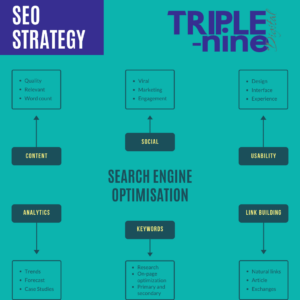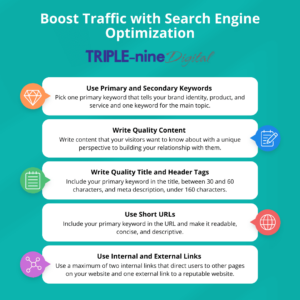SEO stands for Search Engine Optimization, which, according to Moz, is a “set of practices designed to improve the appearance and positioning of web pages in organic search results. Because organic search is the most prominent way for people to discover and access online content, a good SEO strategy is essential for improving the quality and quantity of traffic to your website.”
Part of a marketing strategy is SEO services. These services consist of a combination of things. There is not a magic button that someone can push that says optimize my keywords, make my website rank higher than my competitors, or show my images on page one. Rather, SEO is a combination of a variety of services. There is no one-sized-fits-all approach to this. It’s important to address SEO services with your marketing team or agency, but as a leader, it is also important to be aware of what SEO is, how it can help your business, and then make sure you are paying for only services that are addressing your SEO needs and not for a “bundle” of services you don’t need.
Let’s just skim the top of SEO so that you can have a basic understanding of what it is. If there’s more you’d like to learn, contact our team and we can dive deeper into it with you.
Search engines are sites like Google, Bing, Yahoo. DuckDuckGo, etc. There are so many different search engines that can be used, but according to Joe Barker, all search engines consist of three parts:
Professionals argue over which is the best search engine and why. It is a major science that goes into creating a search engine. And it is even a science of figuring out how to manage SEO for clients. We’ll get to that.
Google is typically the dominant search engine in the world, but there are reasons why some users won’t search through Google, including the theory of information being withheld. Sites like DuckDuckGo are said to be best for users who have privacy concerns and want to keep their browsing information personal. This list could go on and on as to what search engine is best and why, but it typically boils down to personal preference and where the information wanted can be found fastest.
 What is Organic Search?
What is Organic Search?There are two kinds of search results:
It is easier to understand paid results – basically it is results that populate because money is behind that result. Organic search results happen because of strategy! These results then lead to organic traffic, which then hopefully leads to whatever the conversion goal is.
Here’s where it can get confusing and tricky. Organic search results differ from search engine to search engine. It just depends on that search engine’s algorithm. Figuring out that algorithm is a lot of work, research and patience because it is ever changing! There’s never a guarantee that anything will rank in a particular position. The good news is that Google Analytics expert Avinash Kaushik once determined that around 86% of search engine users prefer organic search results. We have been accustomed to scrolling past the ad to get to the first section of results.
The best advice when it comes to SEO is to write for what humans want to read first – SEO second. Like previously mentioned, the “rules” for SEO are constantly changing. So whether you are writing website copy, a blog, social media posts or whatever, write to your audience, post what they want to see, and then think about SEO. After you have your content written, think about keywords. Go back through your text and see if
your keywords are there. If not, add them! Not sure about keywords? There are SEO tools to help with that!

If you are building a website, build it for the user, not the search engine. There is nothing worse than a website that is hard to navigate. User experience ranks higher in our book than SEO factors. SEO can be a second thought in this situation as well. Build your website to you and your target audience’s liking, then address headings, sub folders, mobile friendliness, links, and so on. Test the website to make sure it loads quickly. If not, take care of whatever is slowing it down because that will hurt your SEO. If users are jumping on and then off of your website because it loads too slow, that will hurt your rankings.
And as always, constantly research, improve and update your content, website, whatever it is you are working on. There really is no finish line to this work since it is always evolving. Whatever it is that your competitors are doing, search engines changes, and even your own business/personal changes are always going to happen. A strong online presence gives your business credibility, a professional image, and an improved customer experience. Our team can review your brand through your online listings, SEO scores, social media presence, website speed and more. We can also compare how your business performs online compared to your top competitors. Then we can discuss what the plan should be moving forward if you’d like! Take us up on this opportunity!